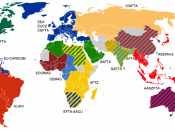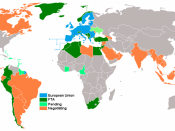Every one of us probably seen reports or heard something about demonstrations against globalization when international organizations like the WTO meet. One example was the G8 meeting in July 2001. We have to ask us the question why there are some people who protest against globalization and also against the free trade the WTO stands for.
The main complaint and concern of these groups is unfairness. They say free trade is unfair, the low wages are unfair, the poor working conditions of foreign workers, the environmental standards in less developed countries, the high profits of multinational corporations, the inequality in incomes around the world, everything is unfair. If these reproofs are true it would mean that also free trade and globalization is unfair.
However the people of international institutions and multinational corporations who are in favor of free trade and globalization also use the term fairness in their arguments.
If a multinational company pays low wages in less developed countries, they can claim that the wages are still fairly set because they are above the legal minimum wage standards and that the workers would not get a better opportunity in a company of their country or their government.
The WTO and other international organizations consider free trade even as a help because it will promote economic growth, which in turn will raise the living standards throughout the whole world and reduce also the income inequality in the future.
They suggest that globalization can promote better outcomes for many people what makes the free trade fair.
Both sides, either supporting or depreciating free trade predicate that what they think and support is fair. Of course everyone is in favor of fair trade, nobody could ever proclaim the opposite. But how can supporters of two opposed policies both be in...


